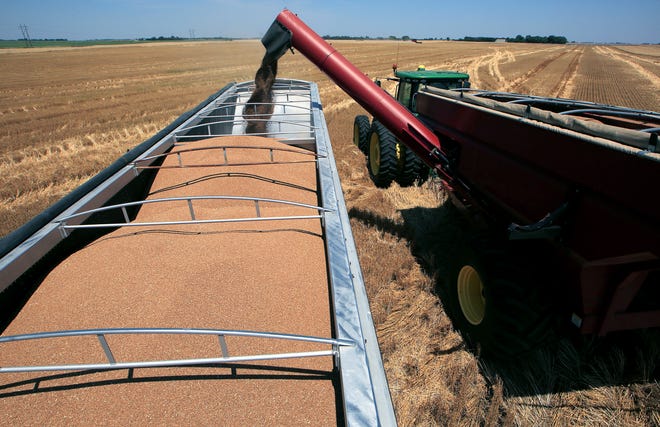May 21, 2025 | 09:19 GMT +7
May 21, 2025 | 09:19 GMT +7
Hotline: 0913.378.918
May 21, 2025 | 09:19 GMT +7
Hotline: 0913.378.918

This past week, farmers in south-central Kansas hit the fields. On Monday, according to the Kansas Wheat Commission, wheat farmers in Labette and Wilson counties mounted their combines. By Tuesday, Allen, Montgomery and Neosho counties joined the mix.
Brent Stuckey, who farms in Reno County, started on Tuesday as well. But he had to take a break on Wednesday, waiting for the wheat to be ready. On Thursday, he and his son-in-law Jonathan Williams were back in the fields.
"When it's right, you gotta go get it quick," Stuckey said. "This spring was pretty good for wheat because it was cool and wet."
This year's crop of Kansas wheat seems to be in good shape, according to the USDA's National Agricultural Statistics Service. As of June 13, the winter wheat condition rated 3% very poor, 8% poor, 25% fair, 53% good and 11% excellent. Its coloring was 79%. This is behind the more than 80% from last year as well as the five-year average. The maturity level was 18%. This is 28% behind last year's maturity.
On Thursday, the coops near Garden City started receiving wheat. But in some places in the state, the wheat is not yet ready. Kevin Royer, the general manager for Midland Marketing Cooperative in Hays, said harvest will not start in Hays until the end of this week.
Along with the wheat, as of last week, according to the USDA, both the topsoil and subsoil moisture supplies rated more than 80% adequate.
With 6 1/2 days suitable for fieldwork, the Kansas Wheat Commission reported that yields were similar to last year, with test weights at either 60 pounds per bushel or higher.
For Stuckey, they were higher, coming in at 63 pounds per bushel. He also said his yields were well above average. Although Stuckey has utilized grazing and cover crops for the past four years, he has recently started a new procedure.
Both Stuckey's father and grandfather tilled and plowed the land right outside of Abbyville that he now farms on. Fifteen years ago, he stopped tilling. Four years ago, he introduced cover crops and rented out a small chunk of land to ranchers for their cattle to graze on. Then he realized he wanted to do more to regenerate the soil, but he wasn't sure what.
Last year, when Stuckey heard about the General Mills regenerative agriculture program, he signed on. He quickly started instituting the advice of Understanding Ag's agronomists, who are helping the farmers with regenerative methods.
Stuckey had used primarily rye and radishes for cover in the past, but this year, following Understanding Ag's advice, he used a more diversified cover crop blend and rented out more of his land for winter cattle grazing. He said because of the new seeds, the frost and drought stress did not bother this year's crop.
"We've seen frost not really bother the new varieties of wheat," he said.
What Stuckey is concerned about is the high cost of diesel, equipment and labor.
"It's just a roller coaster," he said. "Good (commodity) prices don't mean profit because the high expenses come right along with it."
But Stuckey enjoys what he does. He said he and his wife Denise are focused on eventually passing on the farm. By using regenerative methods, using less chemicals and inputs, they want to leave the ground better for their grandchildren's generation.
"We're doing it for the next generation," Stuckey said. Stuckey's 3-year-old grandson Kase can sit all day in the combine and keep asking questions about farming. This, Stuckey said, keeps him wanting to do more for the land.
(The Hutchinson News)

(VAN) In 2024, over 295 million people across 53 countries and territories faced acute hunger—an increase of almost 14 million people compared to 2023, while the number of people facing catastrophic levels of hunger reached a record high.

(VAN) World Environment Day 2025 (June 5) carries the theme 'Beat Plastic Pollution' continuing to emphasize the global urgency of addressing the plastic waste crisis.

(VAN) This was the assessment shared by experts at the workshop titled 'Assessing the Role and Potential of Low-Emission Rice Production Systems in Vietnam,' held on the morning of May 19.

(VAN) Cai Rong Port is the fisheries control center of Quang Ninh, helping to monitor fishing vessels, combat IUU fishing, and remove the EC's 'yellow card'.

(VAN) The German Agricultural Society (DLG) explores the possibility of establishing a mechanization service center in Vietnam’s Mekong Delta to support farmers in accessing and utilizing advanced machinery.

(VAN) On May 16, the Department of Water Resources Management, in collaboration with the Food and Agriculture Organization of the United Nations (FAO), held a signing ceremony for the GEF-8 project document.

(VAN) Food safety, mechanization, vocational training, and market opening are key areas of cooperation expected between the Vietnamese Government and the Federal Republic of Germany.